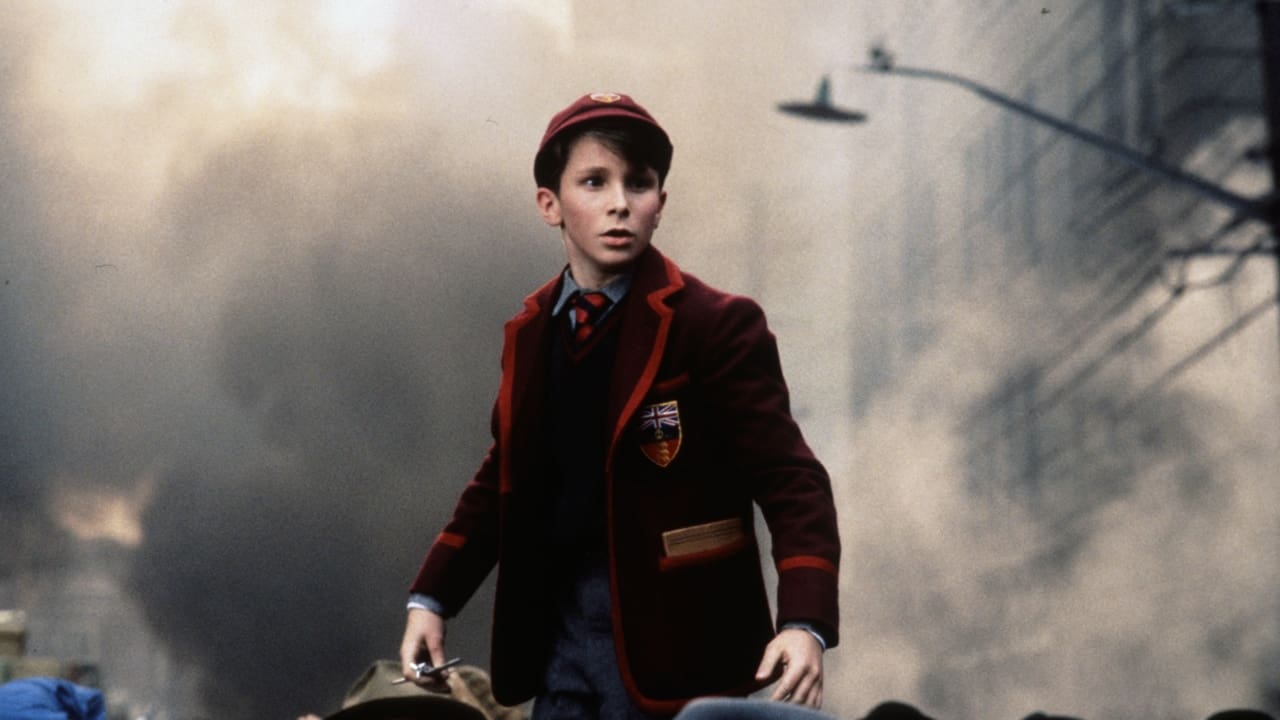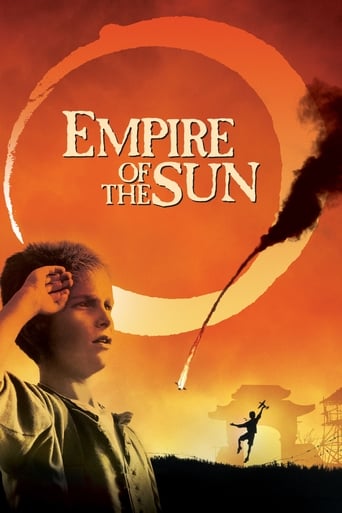Tedfoldol
everything you have heard about this movie is true.
TeenzTen
An action-packed slog
Ezmae Chang
This is a small, humorous movie in some ways, but it has a huge heart. What a nice experience.
timashworth04
I am amazed at the few who gave this low ratings. It is, for me, one of the great world war two movies. Told from the p.o.v. of a bright intelligent young English boy who has led a pampered life , we see how the larger world struggles force him to adapt and live by his wits in order to survive. Although the photography, special effects and scenes of battle are amazingly shot to make you feel a part of the action, it is the personal story of a young boy becoming a man that is compelling. We are shown how he experiences not only the horror of war, but the beauty of it as well, as emotions are heightened by life and death struggles. I wish I had seen this on the big movie theater screen, but still worth watching in any setting.
javiloria
Awesome in all aspect! This movie is a piece of art! ... showing through Jim's eyes the war!
Daniel Hart
GOD playing tennis: that's what Jim Graham (Christian Bale), a privileged British schoolboy living in high colonial style in the pre-Pearl Harbor Shanghai of 1941, sees in one of his dreams. God taking a photograph: Jim thinks he sees that four years and seemingly several lifetimes later, as a starving, exhausted prisoner witnessing the brilliant light of the atomic bomb.What transpires in between, the sweeping story of Jim's wartime exploits after he is separated from his family, is set forth so spectacularly in Steven Spielberg's ''Empire of the Sun'' that the film seems to speak a language all its own. In fact it does, for it's clear Mr. Spielberg works in a purely cinematic idiom that is quite singular. Art and artifice play equal parts in the telling of this tale. And the latter, even though intrusive at times, is part and parcel of the film's overriding style.Yes, when Jim crawls through swampy waters he emerges covered with movie mud, the makeup man's kind; when he hits his head, he bleeds movie blood. It's hard not to be distracted by such things. But it's also hard to be deterred by them, since that same movie-conscious spirit in Mr. Spielberg gives ''Empire of the Sun'' a visual splendor, a heroic adventurousness and an immense scope that make it unforgettable.There are sections of ''Empire of the Sun'' that are so visually expressive they barely require dialogue (although Tom Stoppard's screenplay, which streamlines J. G. Ballard's autobiographical novel, is often crisp and clever). Its first half hour, for example, could exist as a silent film -an extraordinarily sharp evocation of Shanghai's last prewar days, richly detailed and colored by an exquisite foreboding. Jim is first seen singing in a church choir (the Welsh hymn ''Suo Gan'' will echo again hauntingly later in the story), then gliding through crowded streets in his family's chauffeur- driven Packard. At home, he asks his parents off-handed questions about the coming war. When the three of them, elaborately costumed, heedlessly leave home for a party on the other side of the city, it's clear that their days there are numbered just from the way the Chinese servants wave goodbye.That first glimpse of the choirboys will prompt audiences to wonder which of these well-groomed, proper little singers is to be the film's leading man. Mr. Bale, who emerges from the choir by singing a solo, at first seems just a handsome and malleable young performer, another charming child star. But the epic street scene that details the Japanese invasion of the city and separates Jim from his parents reveals this boy to be something more. As Mr. Bale, standing atop a car amid thousands of extras and clasping his hands to his head, registers the fact that Jim is suddenly alone, he conveys the schoolboy's real terror and takes the film to a different dramatic plane. This fine young actor, who appears in virtually every frame of the film and ages convincingly from about 9 to 13 during the course of the story, is eminently able to handle an ambitious and demanding role.But other episodes are less sharply defined. When Jim, who has proudly won his right to live in the American barracks, returns to the British camp in which he formerly lived, it takes a moment to remember why he's back - not because the motive is unclear, but because his departure from the one place and return to the other are separated by intervening scenes.Still, there are many glorious moments here, among them Jim's near- religious experiences with the fighter planes he sees as halfway divine (in one nighttime scene, the sparks literally fly). And there is a full panoply of supporting characters, including Miranda Richardson, who grows more beautiful as her spirits fade, in the role of a married English woman who both mothers Jim and arouses his early amorous stirrings. It is the mothering that seems to matter most, for Jim's small satchel of memorabilia includes a magazine photograph of a happy family, a picture he takes with him everywhere. For a surrogate father, he finds the trickier figure of Basie (John Malkovich), a Yank wheeler-dealer with a sly Dickensian wit. Basie, who by turns befriends Jim and disappoints him, remains an elusive character, but Mr. Malkovich brings a lot of fire to the role. ''American, are you?'' one of his British fellow prisoners asks this consummate operator. ''Definitely,'' Mr. Malkovich says.''Gone With the Wind'' is playing at the biggest movie theater in Shanghai when the Japanese are seen invading that city, and ''Gone With the Wind'' is a useful comparison, at least in terms of subject and style. The makers of that film didn't really burn Atlanta; that wasn't their method. They, too, as Mr. Spielberg does, let the score sometimes trumpet the characters' emotions unnecessarily, and they might well have staged something as crazy as the ''Empire of the Sun'' scene in which the prisoners find an outdoor stadium filled with confiscated art and antiques and automobiles, loot that's apparently been outdoors for a while but doesn't look weatherbeaten in the slightest. Does it matter? Not in the face of this film's grand ambitions and its moments of overwhelming power. Not in the light of its soaring spirits, its larger authenticity, and the great and small triumphs that it steadily delivers.
Bill Slocum
A tough film about the cruelty of war and the death of innocence, "Empire Of The Sun" seems dedicated to a single point, that Stephen Spielberg can make a serious film. Unfortunately, "serious" is not the same as "good."It's December, 1941. Young Jamie Graham enjoys a life of privilege in western-controlled Shanghai, China. Those good times are about to end, thanks to the very same Japanese war machine Jamie idolizes. After the tanks roll in, he is separated from his parents and forced to fend for his own in a bleak landscape.Based on the real-life experiences of author J. G. Ballard, "Empire Of The Sun" is a story about human suffering above all. Another review here, more positive, describes it as "a small story told on a vast canvas," and that captures it for me, too. It's a painterly film, with vivid imagery abounding. In that way, Spielberg often channels the director originally slated to make this, David Lean. That said, I found myself thoroughly alienated from the people and situations involved.Christian Bale is a stunning actor, able at 12 to deliver the kind of performance as Jamie that raps you on the head like a two-by-four. But he's a handful. Either he's talking a mile a minute or staring off into space in some kind of feral transport. He's also really obnoxious and unlikable. This is noticed by some of the other characters, too."You're starting to get on my nerves," says an American scrounger he runs into in Shanghai, Frank (Joe Pantoliano)."Very difficult boy," is the verdict of Sgt. Nagata (Masatô Ibu), commander of the internment camp where Jamie is sent.My favorite is the response given by fellow prisoner Mrs. Victor (Miranda Richardson), when Jamie asks why the Japanese closed the schools: "To punish their parents."You have to find things to entertain you watching "Empire Of The Sun," since this is one time Spielberg won't do that for you. Like Jamie, or Jim as it becomes later, this is serious business all the way through, with starvation and disease gnawing at your elbows and hardly any hope in sight. Don't look for a bright light here; it just may be an atomic explosion."First one side feeds you, the other side tries to get you killed, then it's all turned around," Jim is told by his sometime buddy Basie (John Malkovich). "It's all timing."Malkovich is in great form, as movie-star ready as he ever looked on screen, and to solid effect, but I never got his purpose here. He doesn't bond with Jim, nor figure much in the outcome. No one does; Jim just wanders around until the scene shifts, after long languors, to something else. There's a desperate need here to trim, especially in the beginning and the end, but Spielberg and screenwriter Tom Stoppard are more concerned with Big Moment Cinema. We watch Jim serenade kamikaze pilots with a schoolboy chorale, and a minute later he's cheering their deaths at the top of his lungs, chanting "P-51! Cadillac of the skies!" If Spielberg can't engage you, he'll overwhelm you trying.Spielberg has gone on to make other serious movies, and to my mind, done so more successfully even if his tendency to overpush remains. You see moments here that remind you how good he is at scene-setting, but if I said I cared for five straight minutes watching "Empire Of The Sun," I'd be lying.

